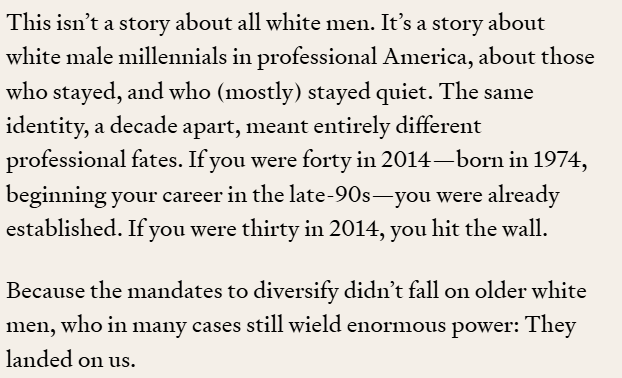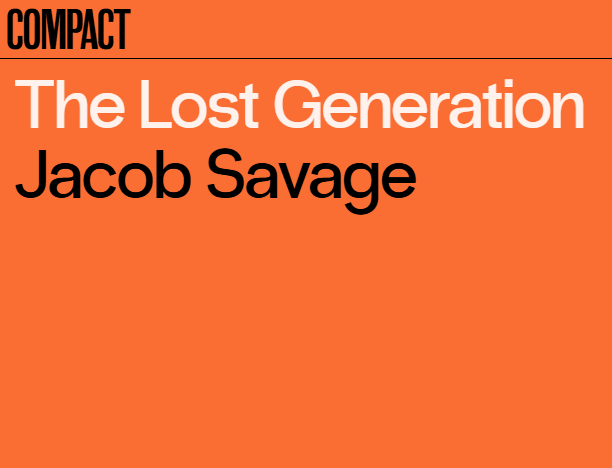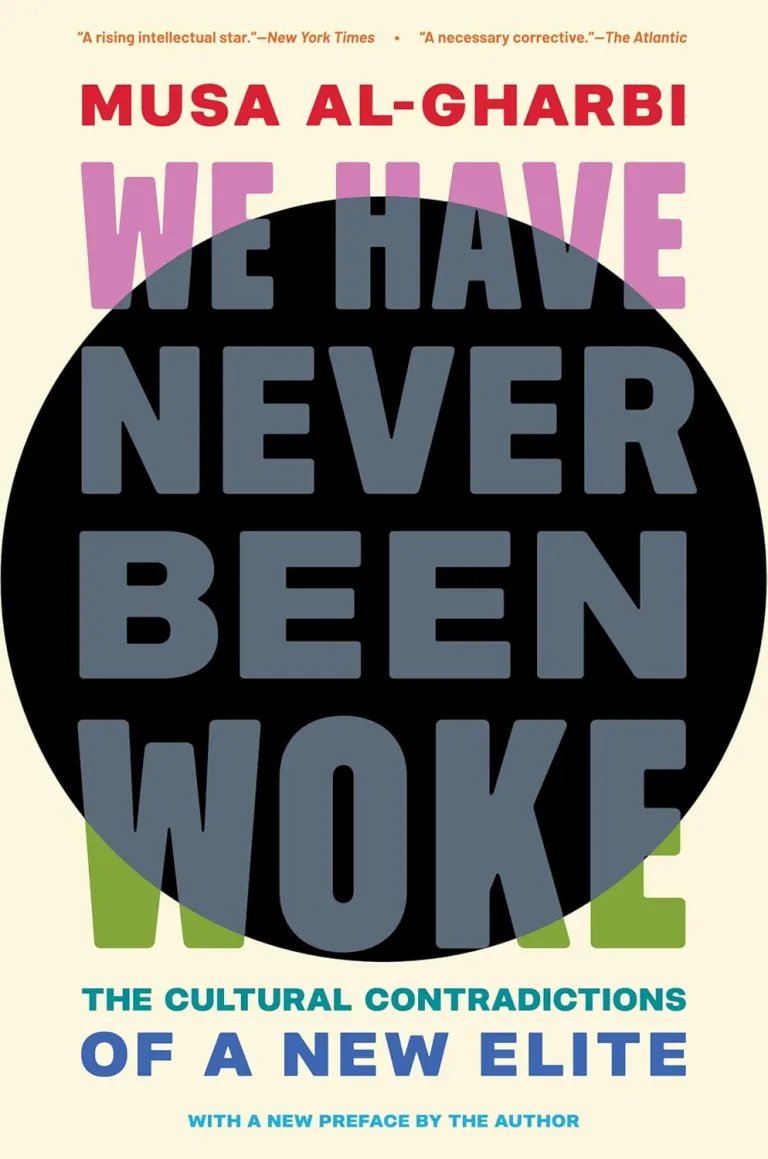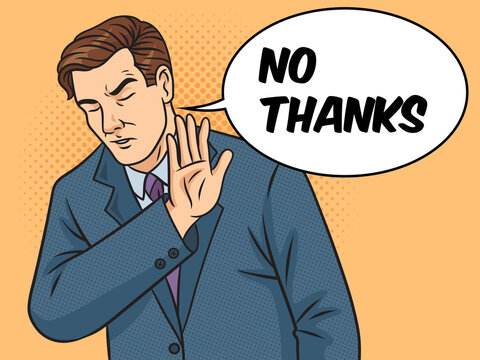Back in @GuardianUS for a piece looking at the racial dynamics of #Election2024.
tldr: polls show Trump poised to take home roughly 20 percent of the black vote. That probably won't happen.
But @TheDemocrats *will* likely see continued losses with black voters. Which may be offset with gains among whites. 🧵
tldr: polls show Trump poised to take home roughly 20 percent of the black vote. That probably won't happen.
But @TheDemocrats *will* likely see continued losses with black voters. Which may be offset with gains among whites. 🧵

Let's start by disabusing readers of one storyline about why the @GOP is unlikely to receive the black vote share that current polling suggests: Kamala's race.
In truth, black voters have been really tepid on Harris. This was clear in the 2020 primaries, in the 2020 general election, and in contemporary polling. Black voters have not shifted towards Democrats any more than any other block has since Biden dropped out. They might've shifted a bit *less.*
theguardian.com/commentisfree/…


In truth, black voters have been really tepid on Harris. This was clear in the 2020 primaries, in the 2020 general election, and in contemporary polling. Black voters have not shifted towards Democrats any more than any other block has since Biden dropped out. They might've shifted a bit *less.*
theguardian.com/commentisfree/…



This is a bit of a tangent (not covered in the article), but here, I think people learned the wrong lessons from the election of @BarackObama.
Yes, he won a higher share of the black vote than typical (), but not because AAs were going to vote based on race. It was because his campaign inspired lots of irregular voters to the polls. And at the time, irregular voters favored Democrats, and irregular voters have always been disproportionately black, so mobilizing irregular voters led to a higher black vote share.
Black voters turned out, not because of Obama's race, but because his "hope and change" policies on economic fairness, turning the page on Bush's foreign policy misadventures, etc.
Compared to other sectors of the Democratic base, black voters, and irregular voters, are especially *unlikely* to be motivated by identitarian appeals. It tends to turn them off.musaalgharbi.com/2020/11/23/oba…
Yes, he won a higher share of the black vote than typical (), but not because AAs were going to vote based on race. It was because his campaign inspired lots of irregular voters to the polls. And at the time, irregular voters favored Democrats, and irregular voters have always been disproportionately black, so mobilizing irregular voters led to a higher black vote share.
Black voters turned out, not because of Obama's race, but because his "hope and change" policies on economic fairness, turning the page on Bush's foreign policy misadventures, etc.
Compared to other sectors of the Democratic base, black voters, and irregular voters, are especially *unlikely* to be motivated by identitarian appeals. It tends to turn them off.musaalgharbi.com/2020/11/23/oba…
This is an even *bigger* tangent that's tough to really get into on Twitter, but, to the extent that black voters *are* motivated by identitarian stuff, they don't necessarily view Harris or Obama as representing themselves.
Most of the commentariat just presents these candidates as "black" and assumes most black voters feel the same. In truth, mixed race, fair-skinned, and blacks of recent immigrant background are NOT widely viewed by most blacks as being uncomplicatedly "black." Of being "like them." Or representing their values and interests.
This is something glossed over by academics and journalists because most "black" people in these spaces are like Kamala Harris, Barack Obama and myself: mixed race, fair skinned and/or of recent immigrant background. And most of us think of ourselves as uncomplicatedly "black," see people like Harris and Obama the same way, and assume/ hope/ assert that most other black people in the U.S. feel the same. We like to suppress this difference. But it's noticed and it's important.
Twitter isn't really the right place for this discussion, but it's something I go into at great length in my book:
And it's relevant to bear in mind for folks who want to tell simplistic stories of black people supporting candidates on the basis of presumed racial affinity. Especially when polling data suggests that there is *not,* in fact, extraordinary excitement around Harris among black voters. There never was, in her entire time on the national political scene up to now.musaalgharbi.com/2024/04/14/we-…
Most of the commentariat just presents these candidates as "black" and assumes most black voters feel the same. In truth, mixed race, fair-skinned, and blacks of recent immigrant background are NOT widely viewed by most blacks as being uncomplicatedly "black." Of being "like them." Or representing their values and interests.
This is something glossed over by academics and journalists because most "black" people in these spaces are like Kamala Harris, Barack Obama and myself: mixed race, fair skinned and/or of recent immigrant background. And most of us think of ourselves as uncomplicatedly "black," see people like Harris and Obama the same way, and assume/ hope/ assert that most other black people in the U.S. feel the same. We like to suppress this difference. But it's noticed and it's important.
Twitter isn't really the right place for this discussion, but it's something I go into at great length in my book:
And it's relevant to bear in mind for folks who want to tell simplistic stories of black people supporting candidates on the basis of presumed racial affinity. Especially when polling data suggests that there is *not,* in fact, extraordinary excitement around Harris among black voters. There never was, in her entire time on the national political scene up to now.musaalgharbi.com/2024/04/14/we-…

Back on track: So, if Kamala's race is unlikely to excite, galvinize or mobilize huge numbers of black voters, then why is it that I'm asserting Trump will likely underperform polling with this demographic?
Because even if polls accurately capture overall black sentiment, they may not reflect the attitudes of the black Americans most likely to show up to the polls.theguardian.com/commentisfree/…
Because even if polls accurately capture overall black sentiment, they may not reflect the attitudes of the black Americans most likely to show up to the polls.theguardian.com/commentisfree/…
To illustrate the difference between public sentiment and "who shows up," consider the typical fate of third party candidates.
Similar dynamics hold for black constituents who are, much like third-party supporters, especially likely to be irregular voters: theguardian.com/commentisfree/…

Similar dynamics hold for black constituents who are, much like third-party supporters, especially likely to be irregular voters: theguardian.com/commentisfree/…
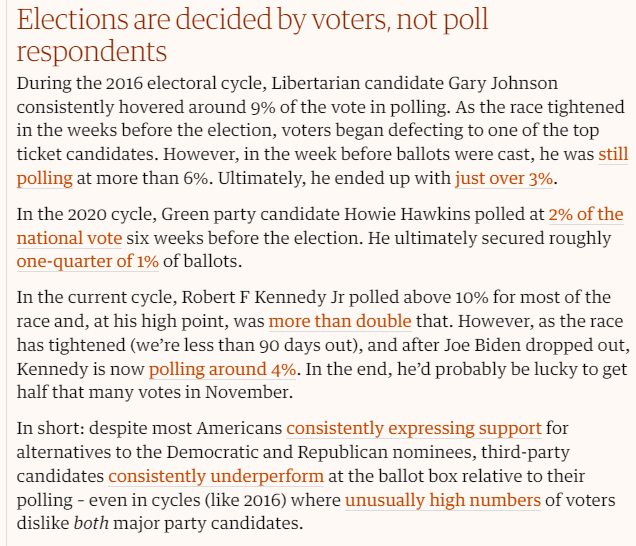

In recent years, irregular voters across ethnic, religious and other cultural lines, have shifted towards Republicans. This is a major change from previous years. And it means that, in elections with high turnout, Republicans are likely to enjoy higher margins with black and Hispanic constituents (who vote less regularly) than in races where turnout is lower:
In general, however, insofar as polls accurately capture the sentiment of black voters as a whole, they may not reflect the preferences of the African Americans who show up at the ballot box (who are more likely to be older, highly-educated, relatively affluent, urban/suburban, and more reliably Democratic).theguardian.com/commentisfree/…

In general, however, insofar as polls accurately capture the sentiment of black voters as a whole, they may not reflect the preferences of the African Americans who show up at the ballot box (who are more likely to be older, highly-educated, relatively affluent, urban/suburban, and more reliably Democratic).theguardian.com/commentisfree/…


Critically, although Democrats are likely to see continued attrition with black voters, these losses seem likely to be made up by gains with *whites.*
White voters have been consistently been souring on the Republican Party, starting in 2016 and continuing through the present: theguardian.com/commentisfree/…

White voters have been consistently been souring on the Republican Party, starting in 2016 and continuing through the present: theguardian.com/commentisfree/…


In the same way that Democrats keep alienating non-white voters by serving them symbolic identitarian bullshit over addressing their practical concerns and priorities, the GOP has been consistently losing white voters under Trump. Because he seems to buy into the mainstream media/ academic accounts of why people support him (they're racists/ xenophobes, etc.) -- and those narratives are actually incorrect.
So he keeps serving up to white voters more of what he thinks they want, and they continue to recoil in horror and shift towards the Democrats. More on these points here:
And here: musaalgharbi.com/2020/08/06/tru…
musaalgharbi.com/2022/11/30/202…

So he keeps serving up to white voters more of what he thinks they want, and they continue to recoil in horror and shift towards the Democrats. More on these points here:
And here: musaalgharbi.com/2020/08/06/tru…
musaalgharbi.com/2022/11/30/202…


The big question of this cycle is whether Trump and @JDVance will continue to alienate white voters at an equal or greater clip as Democrats are driving away voters of color:
The answer to this question will likely determine control of the White House in 2024 (just as it did in 2016 and 2020, and the last two midterm cycles).
/endtheguardian.com/commentisfree/…
The answer to this question will likely determine control of the White House in 2024 (just as it did in 2016 and 2020, and the last two midterm cycles).
/endtheguardian.com/commentisfree/…
• • •
Missing some Tweet in this thread? You can try to
force a refresh





